Donna Sanders is the script supervisor, field producer and food editor for Where The Food Comes From.
This is her behind-the-scenes look at our three days filming with North Carolina potato farmers.
Potatoes, potatoes everywhere but not one around to eat – at least from the fields – this time.
For three Days, Where The Food Comes From drove around the coastline of the beautiful state of North Carolina visiting five potato farms and attending two business functions sponsored by North Carolina Potato Association. I am happy to say this wasn’t as exhausting as it sounds.
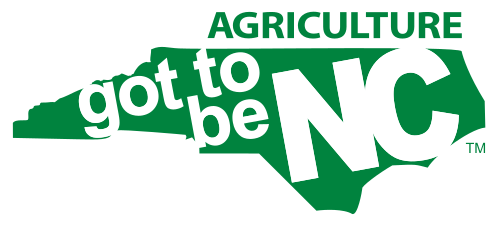
North Carolina has become one of my favorite states to travel to. I love the countryside, cities and, most of all, the people. So much so that given the opportunity I would move there in a heartbeat. You probably have heard me say that before. But atlas, unless I can take my parents, kids and grandkids with me, I am forever stuck in Florida.
So, fasten your seatbelts and let’s begin this ride – I promise it won’t be too bumpy.
First Stop – John E. Ferebee Farming, Inc.
WTFCF visited John E. Ferebee Farming, Inc in Camden, NC on May 19. The interviews that took place were so heartfelt. The farm was discussed, but the focus was on family.
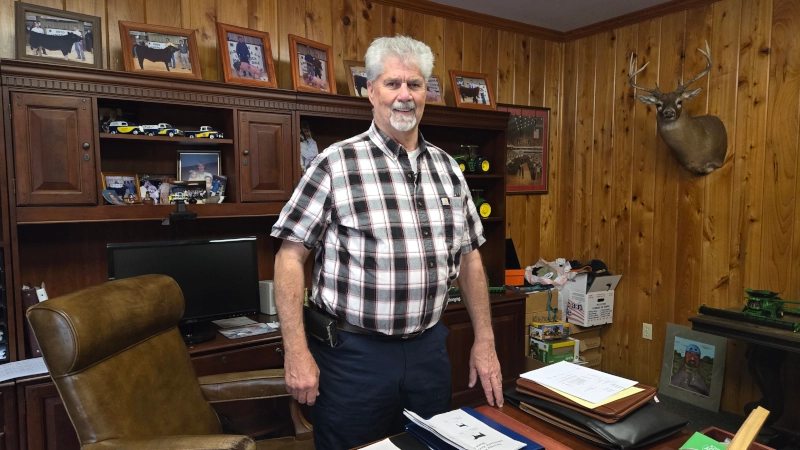
Jeff Jennings
Our first interview took place with the Ferebee Farming President Jeff Jennings. His office was pretty impressive. It is filled with stuffed animals – not toys, trophies – and miniature tractors.
While some farmers worry about legacy and handing down the farm this is totally not a problem here. This farm has been in the family for eight generations and judging by the crib in one of the empty offices, this legacy will continue to thrive. As Jeff put it, “We are family oriented around here.” He went on to say, “Family is everything. Everything else is everything else.” Oh, I do like that.
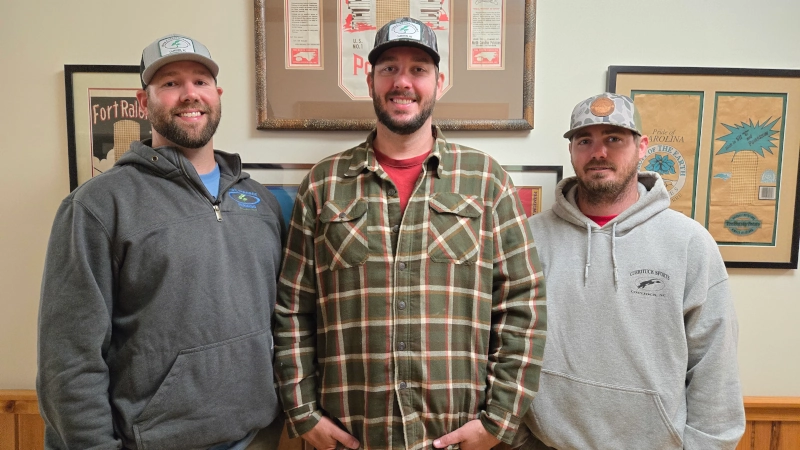
Ethan Meiggs, Austin Jennings, Scott Jennings
Up next, a chat with owner-operator Ethan Meiggs in the packing house. Ethan talked about starting the “young’uns” working at an early age. I agree with that, but my question became what do they do? It turns out they put labels on the potato bags. Totally love it – start that work ethic young.
Throughout our visit, I walked around with secretary-treasurer Martha Ferebee. Before we left, she turned to me and gave me a potato the size of a marble. Martha said, “My daddy said if you carry a potato in your pocket it will turn into a black rock.” I transferred that potato to so many pockets and ultimately washed it. I guess I’ll never find out if this is true.
Chowan Farms Here We Come
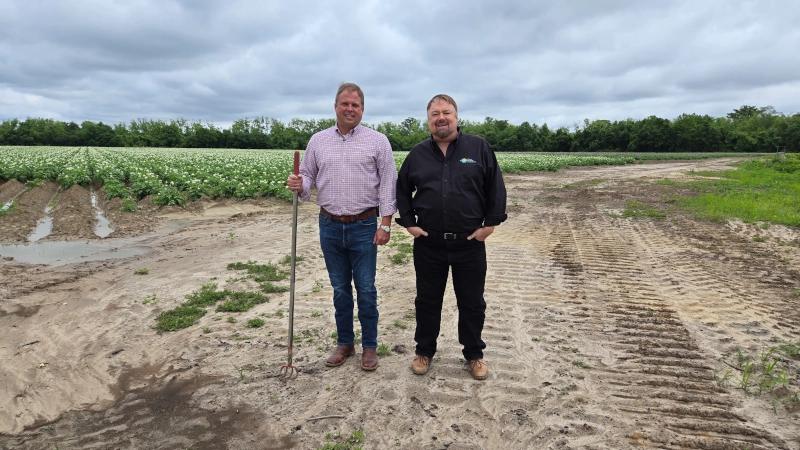
Darren Halstead and Chip Carter
Our next stop took us to Chowan Farms in Edenton, NC, where we met up with Manager Darren Halstead. Chowan Farms is a commercial field where some of the potatoes are made into potato chips. Man don’t tell me that. It just gives me another reason to love NC more. You see, I am a potato chip freak.
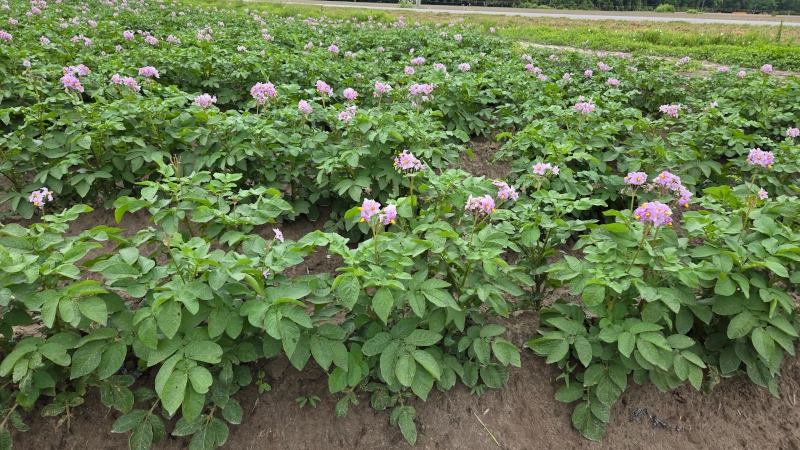
Darren gave us insight into the differences in potato plants. Plants with purple flowers produce potatoes that Darren referred to as “dicer” potatoes (think potato salad) and are usually red.
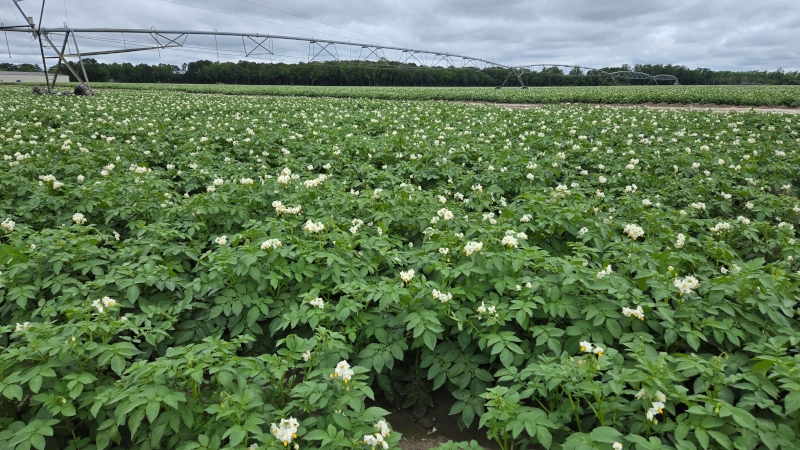
For me, it is the white flowered plant that holds the magic – the “chipping” potato. Yes, it is exactly like it sounds. These plants produce the potatoes that makes potato chips. I was, as they say, in hog heaven. Spoiler alert: Things are going to get even better a little further down the road.
When I open my bag of chips, I never think about the work that goes into making them. And yes, you guessed right – I am going to share a little of what I have learned.
Let’s start with the magical formula:
- Plant some magic potatoes
- Water them with 2.5 to 3 gallons of water a week for 11 to 14 weeks
- Harvest in June
- Make chips ASAP (this potato cannot be stored).
Yield: One pound of potato chips for every four pounds of this magic potato.
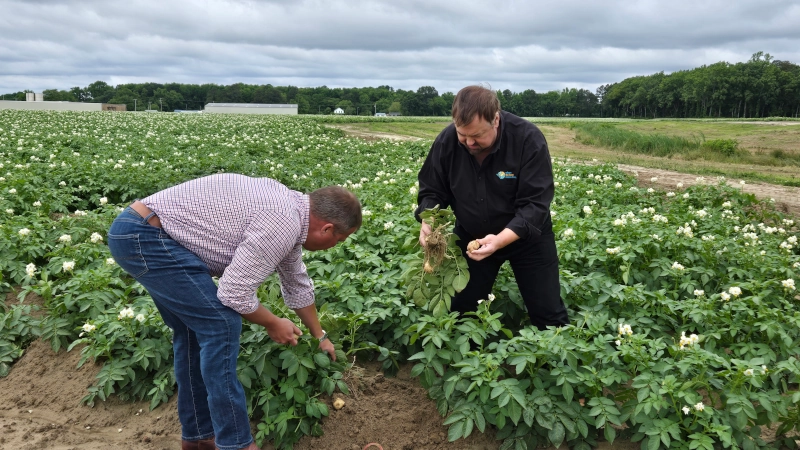
Bus Ride Anyone?
It was time to leave the fields and hop on a bus tour presented by North Carolina State University, sponsored by NC Potato Association. We were off to visit more potato farms, but these farms are a bit different. NCSU is involved in a breeding and genetics program with emphasis on improving sustainability and potato production in Eastern NC.
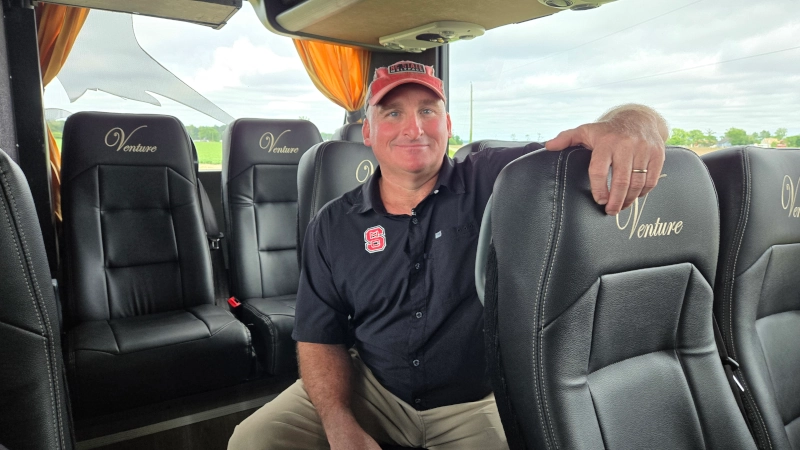
Mark Clough
Chip caught up with NCSU Research Scholar & Extension Associate Mark Clough in the back of the bus. Mark talked about new potato trials going on at James Brothers Table Trial (JVT) and C.A. Perry Chip Trial (CVT) fields. Full disclosure: I think I may have dozed off during this interview – bus rides will do that to you – and can’t give you any details. But you’ll hear it all in the episode.
But I felt so bad for our cameramen. They were standing up backwards in the bus filming. The interview went a long time and you could literally see their hands shaking from holding the cameras and their knees getting weak. But the show must go on! There was a very obvious sigh of relief when they were able to turn around, put the cameras down, and sit (I was awake again by that time).
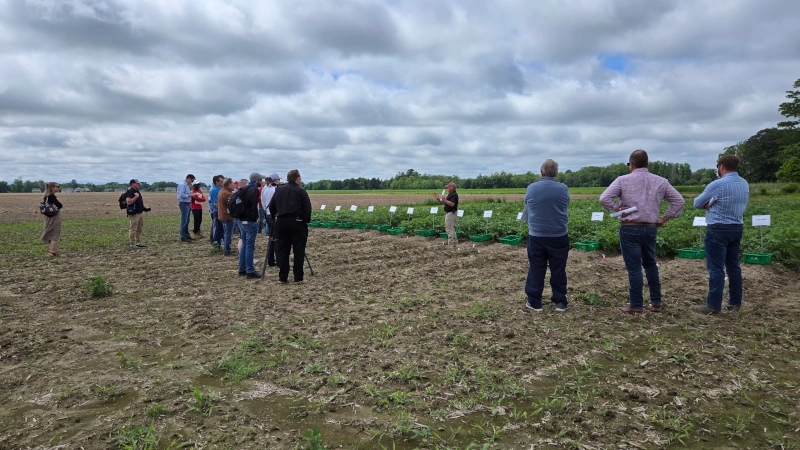
Fun Fact: Say goodbye to the Yukon Gold potato. Don’t panic — it seems like we all just learned about the lovely potato with thin golden yellow skin, but very few farmers are planting it now. That’s because field trials like the ones we saw have produced even better yellow potatoes — they just don’t have that great name. Science – am I right?
Day one of three done. Where will tomorrow take us? Stay tuned.
Black Gold Farms
After a very long ride, with incredibly weird directions, WTFCF visited Black Gold Farms in Murfreesboro, NC May 20. Director of Commodities & East Coast Productions Chris Hopkins met us on the road that led to the farm.
When we got out of the car our sense of hearing was assaulted. I knew it was cicada season, but this was positively ridiculous! I have never in my life heard anything so loud. Thankfully the cicadas were not in the potato fields or I wouldn’t have been able to hear the interview and, for that matter, neither would you – I don’t think our microphones would have been able to block out the sound of all that buzzing.
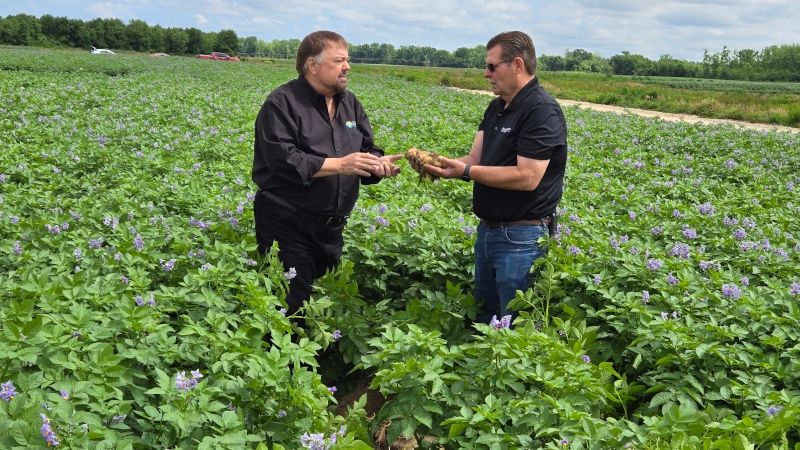
Chip Carter and Chris Hopkins
Black Gold Farms is yet another commercial farm that grows “dicer” and “chipper” potatoes, and they actually have their own private test fields. The fields of blue and white flowers are probably the prettiest you will see. For these fourth-generation farmers quality control is a high priority and they have folks check the plants every day for disease and pests – no small task given the size of the fields.
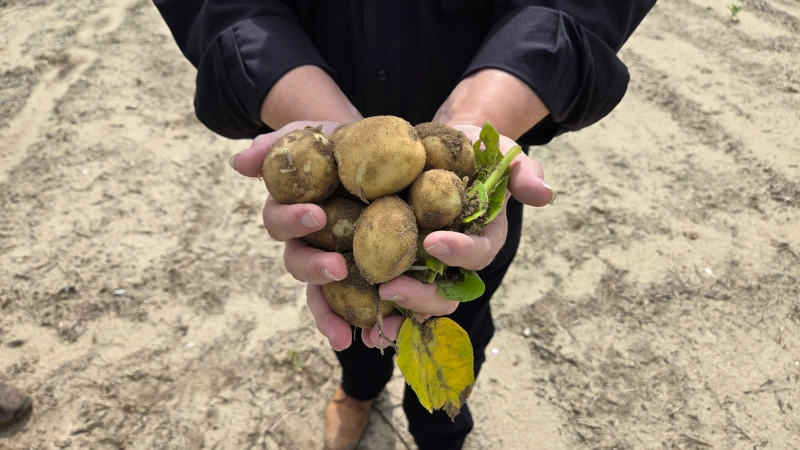
Chris explained these potatoes need to have exceptional quality inside and out. They have a high specific gravity, meaning a lower water content, which is critical to making a great potato chip because it requires less oil for cooking. Once harvested, these potatoes are turned into chips and sent to stores within 24 to 48 hours. Yeah, things move quick.
I know this is a lot of detail but there is a reason. Black Gold Farms produces the potatoes that only one very large company uses to make potato chips. Fun Fact: It is the most popular brand of potato chip in the United States. It’s the only brand I buy – and have bought for years. And no, I can’t mention them by name.
How about another fun fact? Fun Fact 2: During the Covid pandemic NC actually ran out of chipping potatoes. Because everybody was sitting at home eating potato chips. Which truly gives new meaning to the term couch potato.
But the best part, what I alluded to earlier, is Chris let me take home some of the potatoes Chip is holding in the picture. Unfortunately, I am still waiting for the potatoes to grow eyes so I can plant them. But I fully expect them to taste like my favorite potato chips!
Off To The Next Stop
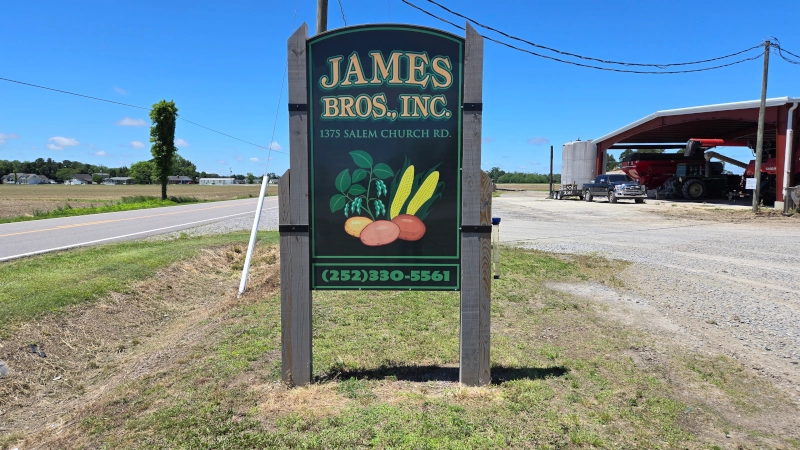
On the afternoon of May 20 WTFCF visited Elizabeth City, NC, and spoke with President of James Bros. Reuben James and Vice President Eric James. Most of our interviews take place in the fields or offices, but not this one. This one took place inside the storage cooler. I am very grateful there were no crops in it and only the fans were running.
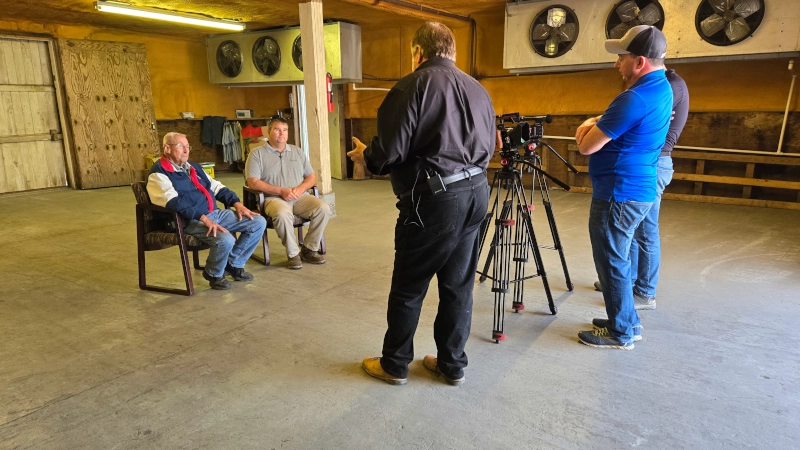
Reuben James, Eric James, and crew
James Bros., Inc is a sixth-generation farm. Eric, like most farm kids, went to the fields after school and at age 15 realized just how hard and important farming is.
Remember folks it is May, and the potatoes are not quite ready to be brought in. So what exactly is going on at the farm? They are getting the equipment ready for harvest and production and it was the huge production shed I found to be absolutely fascinating. With the help of Mr. Reuben, I got a lesson in economics and creative recycling.
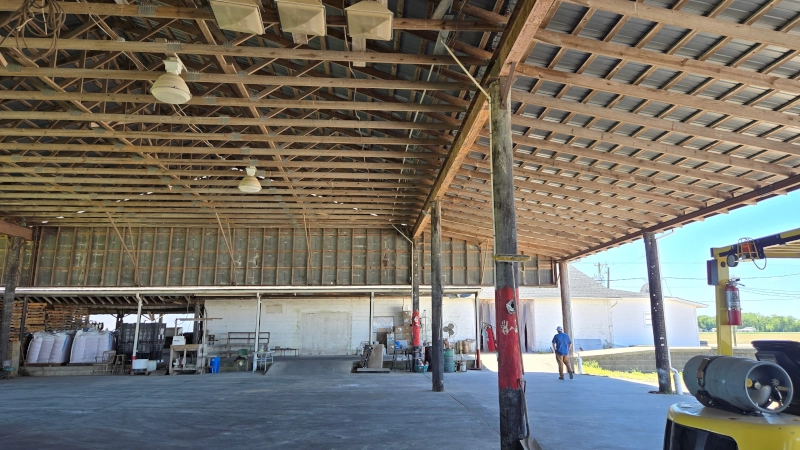
The above image shows ingenuity at its finest. Mr. Reuben explained approximately 25 years ago the production shed needed an overhaul. The eyebeams actually came from a bridge that was being taken down and the poles are pylons purchased from a shipyard. Like they say, “Where there is a will there is a way.”
I really liked what Mr. Reuben said, “Work the land and it will take care of you.” Hmm, gives you something to think about on so many levels.
Dinner Time And More Interviews
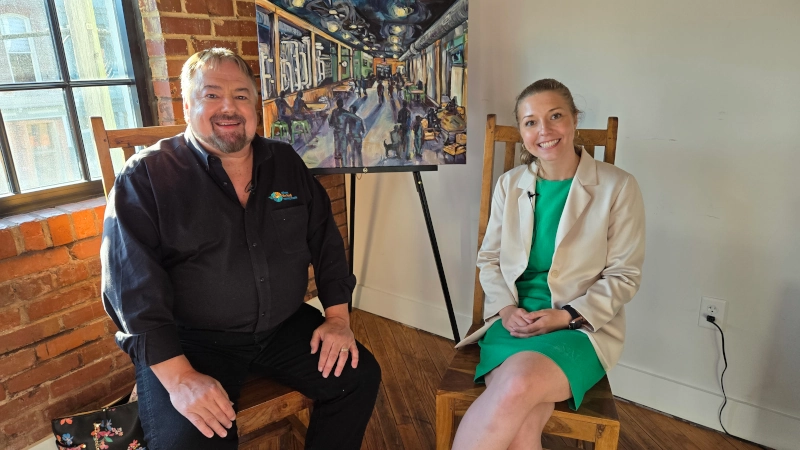
Chip Carter and Alyssa Green
In the conference room at a brewery in Elizabeth City, NC, Chip caught up with Alyssa Green, who does research and communications for Potatoes USA. Alyssa represents growers and spreads the word about potato farming across the country. Chip and Alyssa spoke about potato research and promotion and the needs of potato farmers.
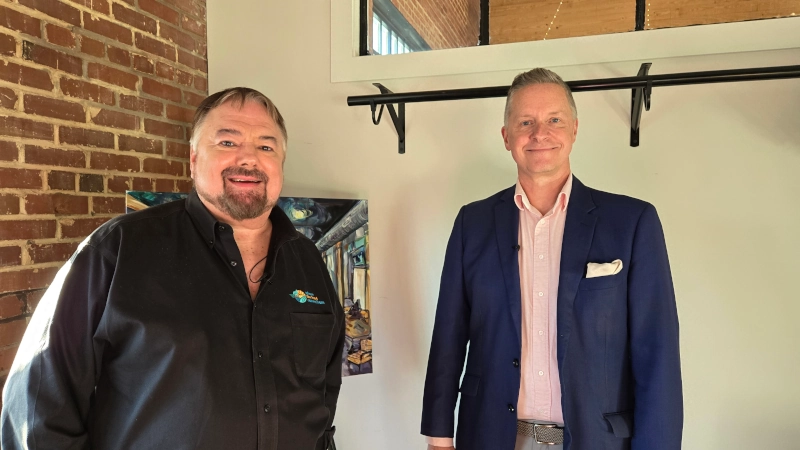
Chip Carter and Kam Quarles
Kam Quarles is the CEO for the National Potato Council. He has the privilege of representing potato growers’ interests in Washington, D.C. which includes working on the Farm Bill. This conversation was well over my head, but you will hear it in the interview.
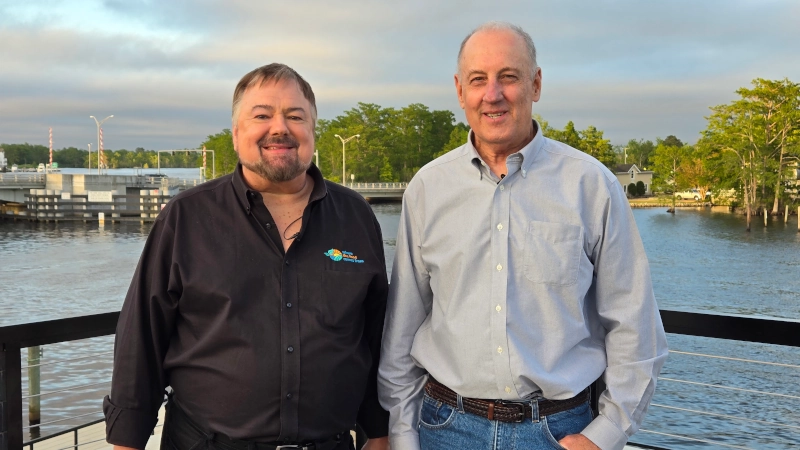
Chip Carter and Tommy Fleetwood
Up next a conversation with Tommy Fleetwood. Tommy worked as the Executive Director for NC Potato Association from 2000 – 2022 and I am thrilled to say he is currently Vice President of Business Development for WTFCF.
Digression time: More than that, Tommy is one of my top five favorite people – I can tell you the others but this is not the time nor the place. You see, out of all the wonderful people I have met since traveling with the show, Tommy has been the only person who actually seeks me out to say hello. The first time this happened was during the shoot for Season 3, Episode 4 Round The Table – A top-Down View Of Agriculture. I was doing who knows what when Tommy came up behind me, tapped me on the shoulder, reintroduced himself and actually asked how I was doing. This had never happened before or since then. Yes, it really left an impression. If we had more Tommy Fleetwoods the world really would be a much better place.
We are honored to have Tommy as part of the WTFCF Team. His unconditional support is amazing. And thank you Tommy for orchestrating the last three days in your beautiful state.
Not Quite Home Yet – Swan Quarter Here We Come
On our way to Raleigh, we had one more stop to make. WTFCF visited the home of Pamlico Shores Produce in Swan Quarter, NC May 21. Here, Chip spoke with President of Pamlico Shores Produce Hunter Gibbs.
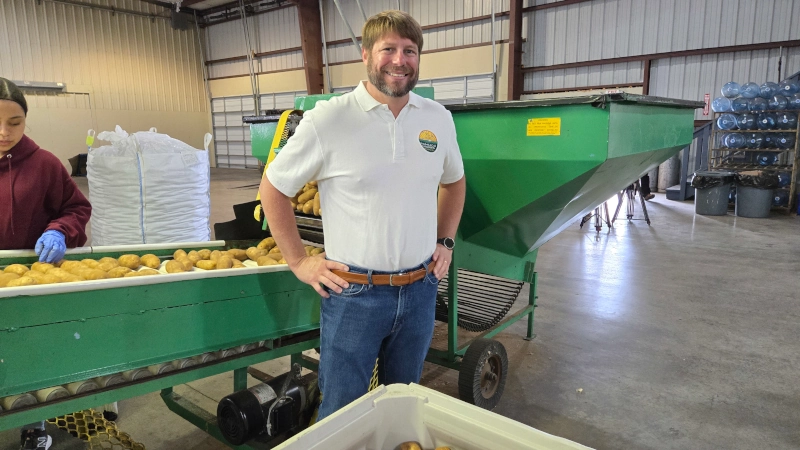
Hunter Gibbs
I have had the privilege of meeting Hunter a few times and I feel he is a bit on the shy side. But don’t let his shyness fool you. Hunter has been growing potatoes for fifteen seasons and currently has a contract with a major grocery chain – more about that in a minute – and with his business savvy has turned his farm into an international business supplying potatoes year-round.
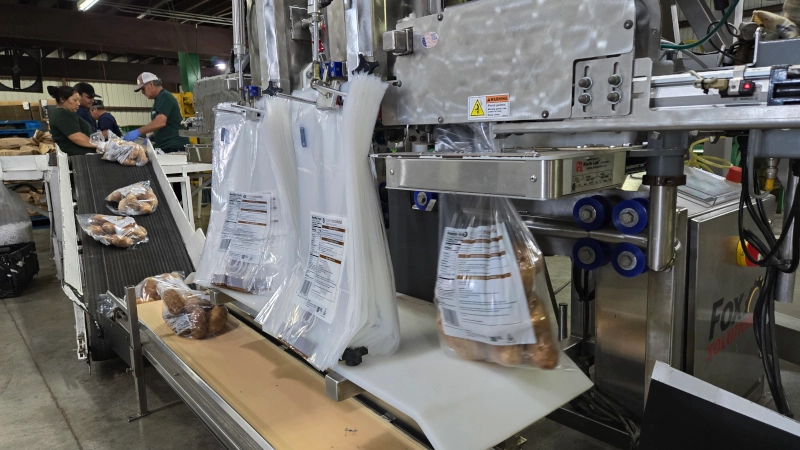
And it was here that I finally got to see potatoes — from California since NC wasn’t in season yet — being bagged up. For those of you who haven’t been to a packing house it is pretty cool to watch. The potatoes start off in a huge hopper, continue onto a conveyor belt and are hand sorted. The ones that make the cut continue to the bagging section for shipping and the others are tossed into a bin.
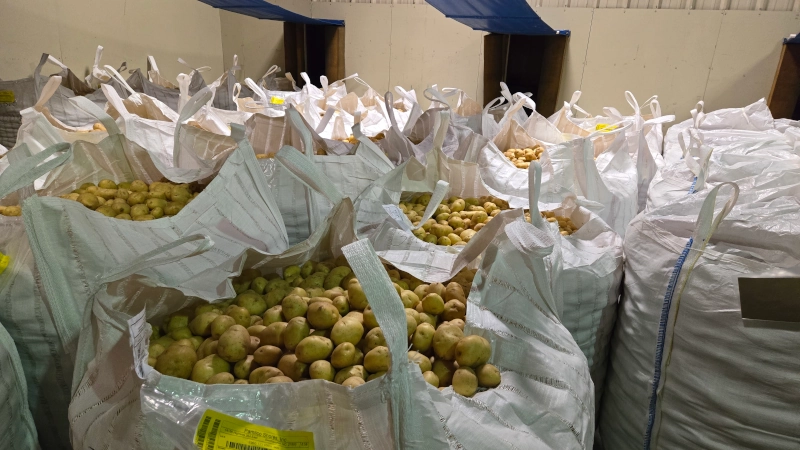
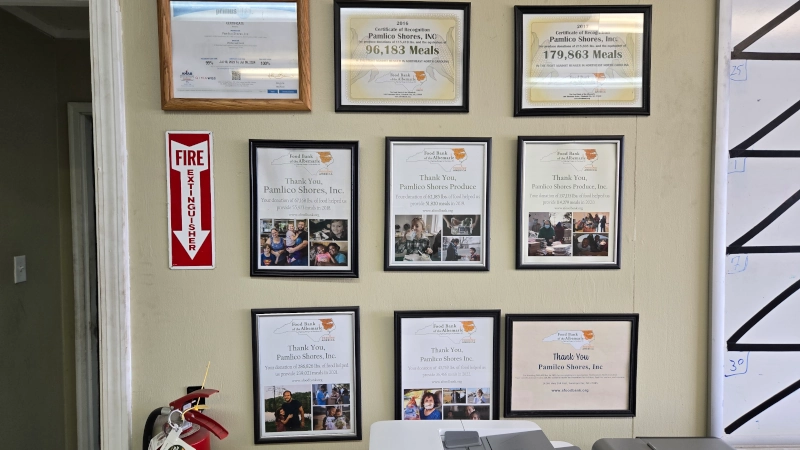
A few of many
But the really cool thing is the potatoes that don’t make the cut are put into 50-pound bags and donated to food banks. Keep in mind, the nutritional value of bruised or small produce is exactly the same. As consumers we lean toward only buying the prettiest stuff, which is honestly a bit short sighted of us. Per Hunter, “We are proud of what we donate.” And judging from the many plaques on the wall so are the food banks.
What about that major grocery chain I spoke about earlier? Let’s just say the chain has 1,373 stores located in the Southeast, with Florida having the most. One day, I was out grocery shopping and bought a bag of potatoes. I washed, wrapped, and stuck them in the oven. The smell of the potatoes baking was amazing. And the taste was even more amazing! I looked at the bag and it was from Pamlico Shores Produce. Way-to-go Hunter.
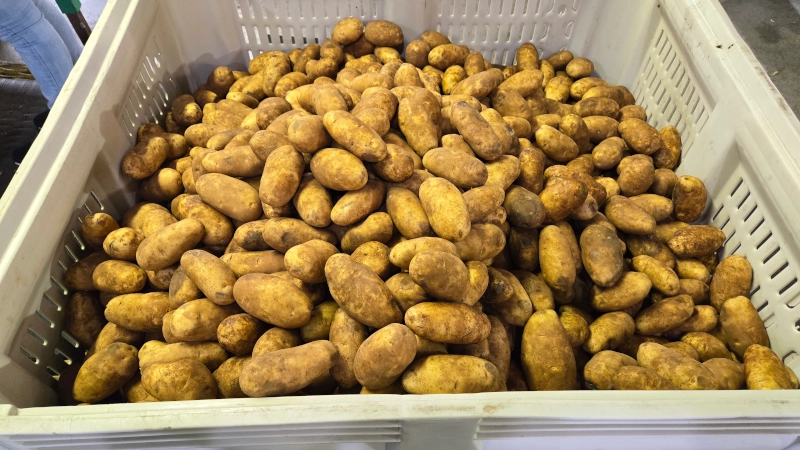
Well folks you made it. Our three-day trip to NC potato farms has ended. When I was thinking about this article, I thought to myself, “Five potato farms. How is there going to be anything different to say about them?”
Honestly, I was amazed how different my take was. We have a legacy story, learned the differences between “chipper and dicer” potatoes, where the amazing potato that makes my favorite potato chip is grown, farming ingenuity, and met an up-and-coming entrepreneur. And as a bonus met even more wonderful people.
This turned out to be one very successful (and delicious) trip and I am so glad to know there will always be more stories to tell out of my favorite state of NC.
Watch Part 1 here
